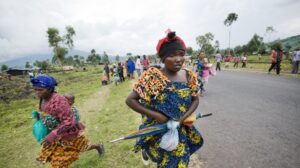
Mainstream feminism often stops at national borders. It focuses on the fights closest to home: reproductive rights in the U.S., workplace equality, gender-based violence in local communities. But this version of feminism is limited. It ignores how global systems of oppression shape the lives of many women, children, and communities.
Going deeper means connecting the dots between local struggles and global injustice. It means recognizing that the comfort and convenience of the Global North often comes at the expense of people in the Global South, especially Black and brown communities whose suffering is rendered invisible. The Democratic Republic of Congo (DRC) is one of many places where this plays out on a devastating scale: decades of genocide, violence, exploitation, and resource extraction intersect with gendered oppression and environmental destruction, creating immense human and ecological suffering.
History
Before colonial intrusion, Congo was home to thriving kingdoms, vibrant trade networks, and diverse cultures. Communities lived off the land, building complex political and social systems. That changed when foreign powers descended on the region in search of profit.
In the late 1800s, King Leopold II of Belgium claimed Congo as his personal possession. What followed was nothing short of genocide. Millions of Congolese were murdered, mutilated, or worked to death to extract rubber, ivory, and minerals. Children’s hands were cut off as punishment for failing quotas. Whole communities were terrorized into submission so foreign powers could enrich themselves.
When Congo finally gained independence in 1960, foreign governments and corporations quickly intervened to destabilize the new nation, assassinating leaders like Patrice Lumumba and propping up dictators who served outside interests. The cycle of plunder never stopped; it only changed hands.
The Crisis Today
What’s happening in Congo today is a direct result of centuries of exploitation and interference by foreign powers and multinational corporations. These forces continue to profit from Congo’s vast wealth while backing or enabling actors who keep the region unstable. This is not an accident; it is a system designed to maintain control and extract resources.
The human cost is staggering. As of 2025, nearly 7 million people are displaced, with over 21 million requiring humanitarian aid. Children are starving, entire families are uprooted, and many have lost everything multiple times over.
Sexual Violence as a Weapon of War
Sexual violence is systematic and widespread. In 2023 alone, over 130,000 cases of sexual violence were recorded. Women and girls are targeted not just by rebel groups, but also by state-aligned militias and armed actors. Rape is used as a weapon of war, destroying families and communities while international media barely notices.
Child Labor Fuels the Global Tech Economy
Congo supplies more than 70% of the world’s cobalt, along with significant amounts of coltan, copper, and gold, minerals essential for smartphones, laptops, electric car batteries, and other technologies that power daily life around the globe. Children are forced to work in hazardous mines, digging with bare hands, carrying heavy loads, and breathing in toxic dust. They are robbed of their education, their health, and their future so that foreign corporations can extract profit and further the power and comfort of imperial nations.
Multinational corporations are complicit. Glencore, CMOC Group, Apple, Tesla, and other companies rely on cobalt and coltan mined under these conditions. Some hide behind subcontractors, others behind certification schemes that mean little on the ground. But the truth is clear: the profits of these corporations are built on Congolese suffering.
The violence in eastern Congo is not random. It is a systemic crisis, fueled by foreign powers, corporate greed, and the long legacy of colonial plunder. To write it off as internal conflict is to erase the truth: this is a global problem created by global systems.
Why This Matters for Feminism
Feminism that ignores imperialism, global exploitation, and racialized violence is incomplete. The crisis in Congo is deeply connected to the struggles feminists fight for everywhere: safety, bodily autonomy, economic justice, and the right to self-determination. Women, children, and communities in Congo are bearing the brunt of sexual violence, child labor, and displacement.
The systems that oppress Congolese communities are the same systems that uphold gendered and racialized hierarchies worldwide. Feminists must demand accountability from corporations and governments, challenge narratives that erase global oppression, and stand with Congolese people in their fight for dignity, safety, and liberation. Understanding and confronting Congo’s crisis is essential to building a feminism that truly fights for all gender-expansive people, women, and girls, everywhere.
Take Action
Here are ways to support and act in solidarity:
Organizations to Support
Friends of the Congo – grassroots advocacy and education
Panzi Foundation – supporting survivors of sexual violence
Congo Children Trust – fighting child labor and supporting children’s rights
Resources & Learning
Breaking the Silence: Congo Week | short documentary
Inside Congo’s Brutal Fight For Survival I Times Explains
Crisis In The Congo: Uncovering The Truth
What You Can Do
– Pressure companies you buy from to prove their supply chains are free of exploitation. Boycott the products you can.
– Share information to break the silence around Congo’s crisis.
– Support feminist movements that center international solidarity.
Visibility without action is empty. Congo’s story is one of unimaginable suffering, but also of resistance and survival. Our responsibility, as feminists and as human beings, is to stand with the Congolese people, not with sympathy from afar, but with solidarity that demands accountability and change.